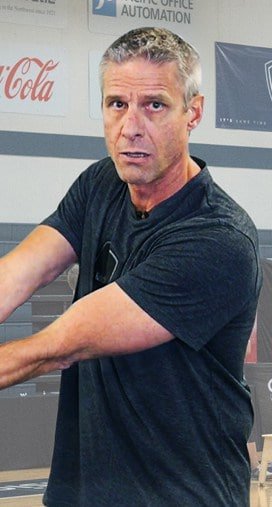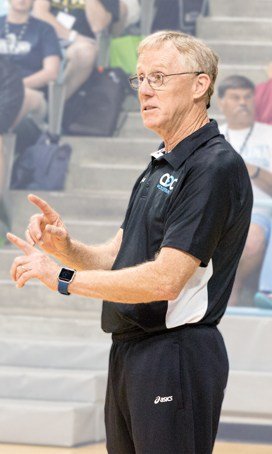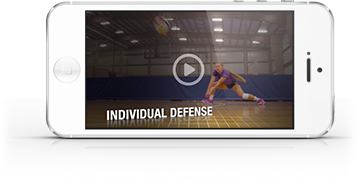
Stephanie Schleuder | AVCA Hall of Fame Coach
Coaching is a demanding profession. I doubt there’s a coach in the country who hasn’t lost his or her cool at one time or another. I certainly have. I grew up watching “tough” coaches punish and intimidate their players. For a long time, that was the norm. But as I gained more experience, I figured out that I wasn’t accomplishing anything with physical punishment and that I was possibly harming the players – mentally, physically or both. Once I came to that realization, I devised better, more holistic ways to motivate athletes. I want to share a few of them with you here.
Lackluster performances
We’ve all experienced times when certain athletes aren’t giving 100 percent, and this is often when we impose physical punishment. But it’s better to get to the root of the problem than to just make players run laps or do push-ups. Whether it’s practice or game situations, a lack of energy or enthusiasm can be attributed to a few things:
- Players may be physically exhausted.
- They could be injured.
- They could be bored.
- They could be distracted.
Talk to them. Find out what’s causing their unproductive behavior. Exhaustion is an important issue that can lead to injuries if it’s not addressed. They may need a day off practice to recuperate. Rest can solve lots of problems.
Of course, injured players shouldn’t be practicing at all. Give them time to recover. In the long run, it’ll be better for them and for the team.
If players talk about boredom, consider making some changes to your practices. For instance, you can alter the pace from slower to faster by running different drills. Maybe challenge the team to get 3 or 4 sideouts in a row off live serves. Or add drills where a coach throws in a free ball directly after a ball hits the floor and challenges the team to convert immediately for another point. Remember, multi-skill drills are always more interesting to players than drills focused on just one skill.
If you notice that players are distracted, find out what’s distracting them. Maybe assignments are piling up in school and they’re stressed about academics, especially if it’s near midterms or finals.
In these situations, I find that these two things really help:
- Have a check-in at every practice. Players and coaches sit in a circle on the floor and each player and coach has 45 to 60 seconds to say how they are or what is going on in their life. They have to end it by saying either “but, I’m ready for practice,” or “and, I’m ready for practice.” If they don’t have anything to say or report, they can just say, “I’m ready for practice.” By starting practices with a check-in, you wouldn’t believe how much I learned about what was going on in players’ lives! It also let me know if they needed a private chat after practice and/or if I should cut them a little slack that day. It got to a point where they shared both their joys and sorrows, and we made sure everyone understood that information shared at check-in was to stay within the team. That helped build trust.
- Give players 2 personal days during the season. They can be used for whatever they want: rest, a mental health break, studying, anything. I had rules about when and how personal days could be used. They couldn’t be the day before a match, and players had to notify me by 11 a.m. the day they planned to take their personal day so I could plan practice accordingly. And they couldn’t take two personal days in a row.
With personal days available, players told me they had an increased feeling of control over their lives. For me, it was a big plus not having to judge who had a good reason to skip practice and who didn’t. Some players always used them, others didn’t. But the option was there. (Practice time missed because of injury or illness didn’t count against personal days.)
Player mistakes in games or practices
This is simple. I have never known a player to intentionally make mistakes during practice or games. Coaches, get over your frustration! This is not about you. Talk to them in a calm voice and find out what’s going on – they may be nervous, stressed or distracted – and then deal with that issue. Hopefully, you’ve already learned the way they most prefer to deal with their errors and mistakes.
Failure to complete a drill in the required way or time
This can be very frustrating, both for coaches and players. First, make sure your expectations are reasonable. I’ve found that the most productive practices are ones involving competitive drills. For example: reserves vs. starters with a goal for each side to win. The more game-like, the better. Maybe the starters have to score 6 points before the reserves score 4. Or, with a full team on each side, the middles have to compete against each other where they score 2 points for a block and one point for a kill. Consider using positive reinforcement if they complete a drill further than they have before so the goal becomes breaking their record, like having a side-out percentage higher than they ever have. Also, be ready with a way to end the drill before frustration occurs.
One year I told the team they were going to earn points throughout the season. We had goals for drills and for matches. If they met the goals, they all got a certain number of points. The more important the goal, the more points I told them they could earn. Our manager kept a running total, and when they met the goal at the end of the season, I gave them each a personalized sweatshirt. They were happy, and we accomplished a lot together.
Rule violations
The most important thing about dealing with violations of team standards or rules is for players to clearly know in advance what is expected of them. As a coach, you can explain the expectations at the beginning of the season or you can choose to let the athletes have some say in team rules and behavior standards. I’ve even gone so far as to “suggest” they decide how they want to walk into a visiting gym – like no headphones or cell phones, all dressed alike, etc. I would challenge you to use something other than physical punishment for rule or behavior violations. Think about other ways for players to mend their ways. Public service, revoking a personal privilege or even a heartfelt personal apology often works.
Stephanie Schleuder coached college volleyball at Alabama, Minnesota and Macalester. She retired in 2009 with 702 career victories and was inducted into the AVCA Hall of Fame in December. Her new book, Brain Training for Volleyball, will be available soon on www.TheArtof CoachingVolleyball.com.




